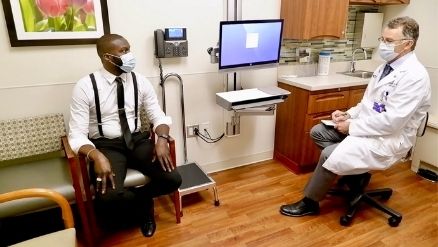
Hematology
Our hematologists provide diagnosis and advanced treatment of various disorders of the blood system.
What Is Hematology?
Hematology is the study of blood and blood disorders. Hematologists and hematopathologists are physicians who specialize in diseases of the blood and blood components, including blood and bone marrow cells.
Our hematologists are specialists in internal medicine who have completed additional years of training focused on managing blood disease, especially cancers. Our hematopathologists have additional years of training in hematopathology, which studies disorders of the blood and bone marrow, as well as the organs and tissues that use blood cells, including the lymph nodes, spleen and thymus. A hematopathologist is often found examining tissue and blood in a laboratory setting.
These specialists can diagnose and treat a variety of diseases, including:
- Anemia
- Infection
- Hemophilia
- Blood-clotting disorders
- Leukemia
- Lymphoma
- Multiple myeloma
- Thrombotic disorders
- Myeloproliferative disorders
- Hemoglobinopathies (including sickle-cell disease)
Treatments
Depending on your condition, your physician may order one or more treatments, including:
- Blood transfusion: You can receive blood or blood components intravenously, either from another donor or your own blood that has been stored for you. This procedure may be necessary if you lose blood in an accident or surgery, or if your own blood is low on the necessary cells to fight disease and keep you healthy.
- Bone marrow transplant: Bone marrow transplants are done to replace damaged bone marrow with healthy bone marrow stem cells following chemotherapy and radiation. Physicians may use the patient's own bone marrow, bone marrow from a relative or other donor or umbilical cord stem cells. Bone marrow transplants are often used to treat lymphoma, leukemia and multiple myeloma.
The Northwestern University Center for Bleeding Disorders
The Northwestern University Center for Bleeding Disorders (CBD) has been a regional leader in treating patients with non-malignant hematologic disorders for decades. We provide outstanding comprehensive clinical care to hundreds of patients annually with a variety of disorders, including:
- Bleeding disorders
- Thrombotic disorders
- Myeloproliferative disorders
- Hemoglobinopathies (including sickle-cell disease)
Care of these patients requires specialized medical expertise and a multidisciplinary approach from physicians, physician assistants, nurses, social workers and others. We pride ourselves on personalized healthcare designed to meet each patient's unique needs.
Patients typically visit the CBD at least once a year. Providing multiple services to a patient during one visit, the center can address many health needs for each patient with the consultation of a physician, social worker, nurse, physical therapist, orthopaedic surgeon and gynecologist, all of whom are available during a comprehensive checkup. Studies show that persons with bleeding disorders who come to the treatment center once a year have fewer problems than those who do not.
Most of all, we strongly encourage self-care and home care so each patient can be in control of his/her own life and condition.
Conditions
Northwestern Center for Bleeding and Clotting Disorders
Our comprehensive center coordinates services for bleeding disorders, attempting to provide many of them in a single visit. For decades we have been a regional leader in the treatment of patients with non-malignant hematology disorders.
Learn more about the Northwestern Center for Bleeding and Clotting Disorders about

Locations & Contact Information
Ann & Robert H. Lurie Children’s Hospital of Chicago at Northwestern Medicine Central DuPage Hospital and Northwestern Medicine Delnor Hospital is a collaborative program between Northwestern Memorial HealthCare and Lurie Children's and its affiliated physician groups. The physicians participating in this program are neither agents nor employees of Northwestern Medicine Central DuPage Hospital or Northwestern Medicine Delnor Hospital.

